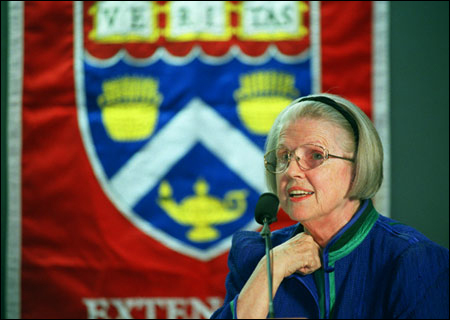Sissela Bok stalks the notion of happiness
Presents ‘field notes’ from travels through happiness studies

With a title like “The Pursuits of Happiness,” it’s no wonder that philosopher and ethicist Sissela Bok packed Science Center C Tuesday night (Oct. 14) for her Lowell Lecture sponsored by the Harvard Extension School: Is there any pursuit more elemental to our existence?
Bok, a senior visiting fellow at the Harvard Center for Population and Development Studies, presented what she called “field notes from my travels” through the interdisciplinary field known, without a hint of irony, as happiness studies. We are, in general, a happier lot than we’ve ever been, she reported, and the secret of happiness lies not in one magic bullet but rather in a mix of predictable factors like good mental health and social relations and a baseline of physical health and wealth.
But Bok’s pursuit, she stressed, has been academic, not practical. She seeks not happiness itself, rather an understanding of its nature, its role in our lives, and its place as intellectual fodder throughout the ages. The subject’s universal impact and centuries-long inquiry provided Bok with a wide sweep of reference, and she drew in commentary from Greek philosophers, Desmond Tutu, Charles Darwin, Virginia Woolf, William James, and the Dalai Lama. More recently, she said, philosophers and poets – who have long weighed in on happiness – have been joined by psychologists, economists, and brain scientists, who enrich the field with their modern perspectives and tools for study.

Not a luxury to be postponed
The pursuit of happiness as a subject for study is not without its detractors, Bok said. “I was almost stopped in my tracks by a dismissive objection to the entire undertaking,” she said. “Why study that subject now? Isn’t it a luxury to do so, given the anguish and the insecurity of our own times?” Perhaps an inquiry on suffering would be more appropriate, some suggested.
To the contrary, she argued; throughout history, happiness has always emerged from a backdrop of suffering. “It is precisely, I think, in times of high danger and turmoil that concerns for happiness are voiced most strikingly and seen as most indispensable,” she said. For examples, she turned to the Bible, the ancient Roman philosopher Seneca, and the Declaration of Independence, which lent Bok the title of her lecture.
“That surely was done at a time of exceptional insecurity and massive threats to life and liberty,” said Bok of our nation’s founding document. “The subject of happiness never was a luxury to be postponed until more serene, peaceful times.”
Indeed, the study of the pursuit of happiness may be more relevant now than ever, in part due to a worldwide shift in the perception of the possibility of happiness. Recent global reductions in illiteracy, infant mortality, premature death, and increases in standards of living and political freedom were unimaginable several generations ago, she said. Average life expectancy in some of the world’s poorest societies, such as Bangladesh, is now higher than that in Britain at the turn of the last century.
“Ancient notions about the need for submissive acceptance of misery, segregation, discrimination… are losing their power,” she said.
The science of happiness
The study of happiness has been bolstered, Bok said, by scientific advances that bring the pinpointing of factors contributing to happiness more within reach. Neuroscientists study brain waves via magnetic imaging; geneticists trace inherited inclinations; psychopharmacologists explore drugs that affect mood.
“It is now possible, for the first time, to compare what large groups of people say about their actual experience of happiness and unhappiness in different societies,” she said, which can inform policies created to enhance human happiness.
These cross-cultural studies have enabled scientists to disprove previous centuries’ armchair philosophers, who observed that most of us are rather miserable. “Most people do not see themselves as leading lives of quiet desperation,” Bok said. Instead, regardless of income level or education, a majority of people regard their lives as moderately or very happy.
It would be naïve to assume that standards of living, health, and access to basic human rights have no bearing on happiness, Bok cautioned, and in fact happiness is more prevalent in democratic societies with higher standards of living. Some anomalies puzzle researchers, however: People in Latin countries report being happier than average, and those in countries along the Pacific Rim are less happy.
Despite advances in the research of happiness, the complexity of human beings has made it impossible to pinpoint any single factor as essential to happiness. “Contemporary research … confirms the fact that it is neither health nor goodness nor poverty, faith, or any other factor that can be seen as the one defining factor,” said Bok.
Historically, both health and virtue have been held up as the philosophical antecedents to happiness, but Bok notes that examples exist to contradict these ideas. “We know quite a few people who may be extraordinarily virtuous but are not particularly happy,” she said, “and we know a certain number of people who are quite the opposite of virtuous but who do seem to be rather happy.”
Still, certain factors – health, being above a certain threshold of economic well-being, and goodness – do correlate with happiness, just as other factors like death, divorce, or prolonged unemployment detract from happiness.
Are we happy or deluded?
Bok addressed the objection of some to the study of happiness that “it is no use asking people how happy they are because most people are simply wrong; they are simply deluded about what constitutes real happiness,” she said. While a measure of skepticism about self-reporting of happiness is healthy, Bok encouraged researchers to persist in their studies.
Both social and hard scientists could amplify their study of happiness by looking to letters, journal, and art for pure expressions of happiness that might elude an experimental survey. Correlating these expressions with self-reporting and scientific imaging of brain waves could produce a more complete picture of true happiness.
“When it comes to conveying the range of depth and richness of experiences of happiness and unhappiness, given all their forms and all their contrasts, art transcends the limitations of particular autobiographical writings,” she said. Happiness studies, then, must truly be an interdisciplinary pursuit.




